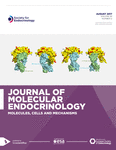Pancreatic islet inflammation: an emerging role for chemokines
- 1Laboratory of Islet Biology and Inflammation, Pennington Biomedical Research Center, Baton Rouge, Louisiana, USA
- 2Department of Surgery, Graduate School of Medicine, University of Tennessee Health Science Center, Knoxville, Tennessee, USA
- 3Department of Microbiology, University of Tennessee, Knoxville, Knoxville, Tennessee, USA
- 4Laboratory of Immunogenetics, Pennington Biomedical Research Center, Baton Rouge, Louisiana, USA
- Correspondence should be addressed to J J Collier; Email: Jason.collier{at}pbrc.edu
Abstract
Both type 1 and type 2 diabetes exhibit features of inflammation associated with alterations in pancreatic islet function and mass. These immunological disruptions, if unresolved, contribute to the overall pathogenesis of disease onset. This review presents the emerging role of pancreatic islet chemokine production as a critical factor regulating immune cell entry into pancreatic tissue as well as an important facilitator of changes in tissue resident leukocyte activity. Signaling through two specific chemokine receptors (i.e., CXCR2 and CXCR3) is presented to illustrate key points regarding ligand-mediated regulation of innate and adaptive immune cell responses. The prospective roles of chemokine ligands and their corresponding chemokine receptors to influence the onset and progression of autoimmune- and obesity-associated forms of diabetes are discussed.
- Received 31 March 2017
- Accepted 18 April 2017
- Made available online as an Accepted Preprint 18 April 2017
- © 2017 Society for Endocrinology











